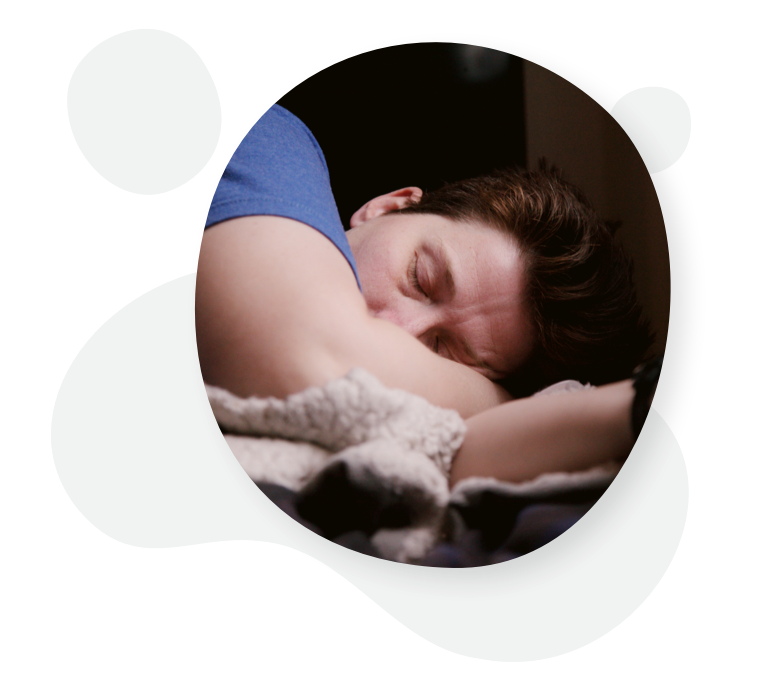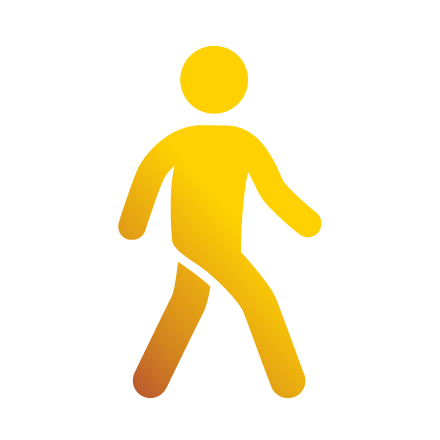Feelings of fatigue and tiredness can make it difficult to get through the day, and can affect your social life, mental health and workplace productivity. Luckily, there are some ways to help beat fatigue, stay alert and feel well rested.1,2
If you're concerned about fatigue, please speak to your doctor or nurse to discuss other factors that could be impacting your quality of sleep.
The importance of sleep
Poor sleep can lead to fatigue, so getting a good night’s rest is very important. Improving sleep hygiene could help improve sleep quality.1-3
Late nights and daytime naps can disrupt the body’s natural day/night cycle and sleep patterns.4,5 Try to develop a regular bedtime and wake up time to get the body into a routine.
Below are some ways to improve sleep hygiene.
ADJUSTING YOUR SLEEP ENVIRONMENT8
Making changes to your sleep environment may help you find the best environment for optimal sleep. These could include:
- Getting comfortable pillows and updating your blanket or doona to suit the season
- Making sure the room is as dark as possible before bed
- Wearing ear plugs if the room is too noisy
- Developing a regular bedtime at a reasonable hour
Other ways of dealing with fatigue
Fighting fatigue can be a challenge, but there are some ways to boost energy levels and lessen fatigue. Some of the following methods may work for you:
EXERCISING REGULARLY9,10
- Exercise can help in many ways – it can increase muscle mass, strength and flexibility, all of which boost energy and can help fight fatigue
- Doing as little as 30 minutes of light exercise every day can increase alertness and improve mood
- Talk to your doctor about which exercises might be right for you or learn more on our Exercise page
EATING WELL11,12
- Eat a healthy, balanced diet, rich in fruits, vegetables and lean protein
- Consider anti-inflammatory foods such as salmon or brown rice, and to find out more about inflammatory foods visit the Diet page
ASKING FOR HELP2,14
- Ask family members or friends to help around the house, or consider hiring a housecleaner to come to the house
- Speak to your doctor about other ways that fatigue can be managed if you are struggling
- Learn more about asking for help on our Communicating and getting support article
Always speak to your doctor before making changes to your health and exercise routine.
Remember, if you have just started a new treatment for your condition, it may take some time for you to adjust to your new medication.
References: 1. Healthline. Tips for sleeping better when living with severe eczema. Available from: healthline.com/health/atopic-dermatitis/sleeping-severe-eczema Accessed: August 2025. 2. Versus Arthritis. Managing fatigue. Available from: versusarthritis.org/about-arthritis/managing-symptoms/managing-fatigue/ Accessed: August 2025. 3. Arthritis Foundation. How to beat arthritis fatigue. Available from: arthritis.org/health-wellness/healthy-living/managing-pain/fatigue-sleep/how-to-beat-arthritis-fatigue Accessed: August 2025. 4. Buxton OM et al. Am J Physiol Regul Integr Comp Physiol 2000;278(2):R373–382. 5. Burgess HJ, Eastman CI. Neurosci Lett 2004;356(2):115–118. 6. Sleep Health Foundation. Caffeine, food, alcohol, smoking and sleep. Available from: sleephealthfoundation.org.au/sleep-topics/caffeine-food-alcohol-smoking-and-sleep Accessed: August 2025. 7. Medical News Today How to stop eczema itching at night. Available from: medicalnewstoday.com/articles/323505 Accessed: August 2025. 8. Better Health Channel. Sleep hygiene. Available from: betterhealth.vic.gov.au/health/conditionsandtreatments/sleep-hygiene Accessed: August 2025. 9. National Eczema Association. How to exercise safely with eczema. Available from: nationaleczema.org/blog/exercising-eczema Accessed: August 2025. 10. Better Health Channel. Exercise and mental health. Available from: betterhealth.vic.gov.au/health/healthyliving/exercise-and-mental-health#bhc-content Accessed: August 2025. 11. National Health and Medical Research Council. Eat for health Australian Dietary Guidelines Summary. Available from: eatforhealth.gov.au/sites/default/files/2022-09/n55a_australian_dietary_guidelines_summary_131014_1.pdf Accessed: August 2025. 12. National Eczema Association. 11 ways to avoid inflammation in your everyday life if you have eczema. Available from: nationaleczema.org/blog/ways-to-avoid-inflammation-if-have-eczema Accessed: August 2025. 13. Yu SH et al. Dermatitis 2016;27(2):50–58. 14. Better Health Channel. Fatigue. Available from: betterhealth.vic.gov.au/health/conditionsandtreatments/fatigue Accessed: August 2025. AC-005092-00. AU-RNQ-250063. August 2025.









